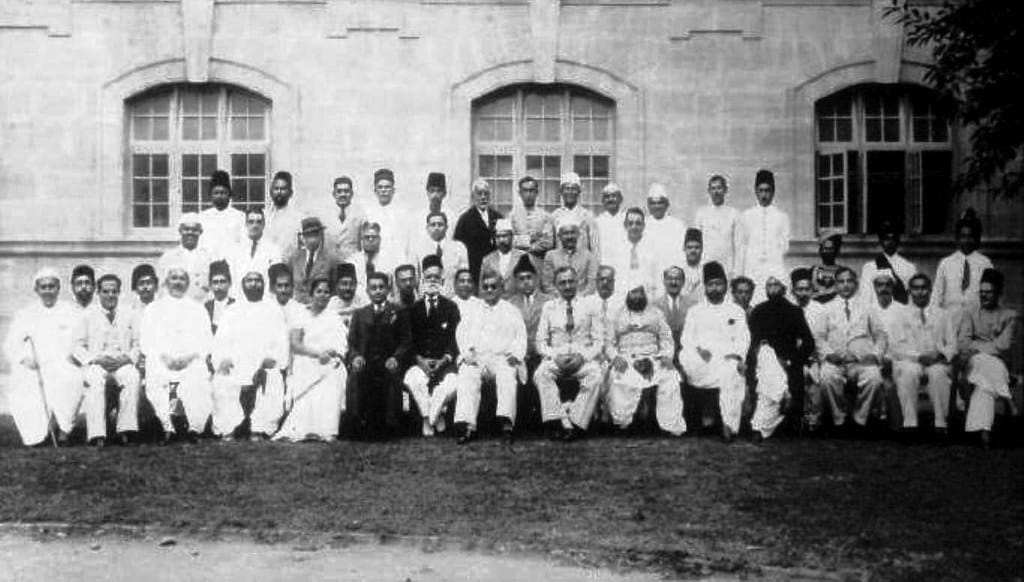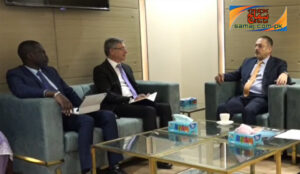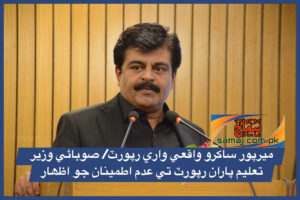Inauguration Day of Parliament in Sindh
By Qazi Asif
On the morning of Tuesday, April 27, 1937, in the hall of the Chief Court (now the Sindh High Court), on the first day of the first ever session of the first ever Sindh Assembly had begun, the Secretary of the Sindh Assembly, read the message of then the Governor of Sindh, Lancelot Graham.
“I, Lancelot Graham, in exercise of the powers conferred by section 65 and sub-section (3) of 67 of the Government of India Act, 1935, appoint [Dewan Bhadur Hiranand Khamsing] as the Chairman of the Sindh Assembly pending the appointment of the Speaker.” He will also have the power to administer oath to the Speaker under Section 67.
With this message, [Diwan Bhader Keim Singh] (Note: same spelling of name) came to the dais, bowed before the members, took his seat, and along with this, the foundation of the modern republican tradition in the history of Sindh was laid. Parliament started its work for the first time in Sindh.
On April 27, 1937, a new sun had risen in Sindh.
This Sindh Assembly came into being as a result of elections held on the communal basis during January and February 1937. Among Muslims, Sindh United Party won 22 seats, Sindh Muslim Political Party won 4 seats, and Sindh Azad Party won 3 seats. Independent candidates won from the remaining 9 Muslim constituencies.
Among the Hindu seats, Sindh Hindu Maha Sabha 11 seats, Congress party 8 seats, 2 independent candidates on two Indian seats and Labor Party one seat, Europeans, industrialists, businessmen and non-party candidates were appointed.
The big thing is that the Sindh United Party, which emerged as the largest party in the House, its two leaders, Haji Abdullah Haroon, defeated by Sardar Allah Bakhsh Gabol from Lyari, while Sheikh Abdul Majeed Sindhi defeated to Sir Shahnawaz Bhutto from the Larkana seat. The two main leaders of the party were lost their seats. Therefore, they could not come to the first assembly of Sindh.
But instead of forming the government to Sindh United Party, the governor invited the Sindh Muslim Party having only three seats in the house to form the cabinet. This was strange and undemocratic norm and decision. The party having majority 22 seats in the assembly was kept out while party having only three seats in the house was invited by the governor of Sindh to form a government. Due to which there was a big explosion.
This undemocratic decision was made forming the first government in the province of Sindh. This practice observed in recent history as Jam Sadiq having one seat was invited to form the government and same situation was with Dr Arbab.
Instead of to discuss this issue further, we will look at the first session of the Sindh Legislative Assembly. This first session lasted for four days. In this session, the Speaker and the Deputy Speaker were elected. If you look at the first assembly, you look at the members, who came in the house their ability, debating and speaking style, wide study, well-rounded knowledge about local and international situation. At one side, Mr. G.M. Syed, Muhammad Hashim Ghazdar, Sheikh Abdul Majeed Sindhi, Pirzado Abdul Sattar, Allah Bakhsh Soomro, Ghulam Hussain Hidayatullah, Khanbhadur Ayub [Kharo], (note: check spelling) on the other side Dayal Mal Doulatram, Ghanshyam Jethanand Shudasani, Gobindram Pritam Das, Jethi Bai Tulsi Das Sepahimlani. , such good names, one by one worthy people.
They came through elections based on communal basis, but they took decisions on secular basis. Example was that in the election of the speaker of the assembly. When Hindu Bhoj Singh Gurdanumal won with the support of Muslim votes from the house. He had defeated Sheikh Abdul Majeed Sindhi, a Muslim, keep in the mind that Muslims were in the majority in the house but they didn’t vote to a Muslim
Let’s look at the speaker selection first.
Candidate for speaker, Pir Elahi Bakhsh, Proposer, G. M. Syed, Seconder Muhammad Ali Alhandu Shah,
Candidate, Bhoj Singh Gurdanumal, Proposer Hemanand Rup Chand Wadhwani, Seconder, R. S. Gokaldas Mevaldas
Candidate, Shaikh Abdul Majeed Leelaram, Proposer, K, B Ghulam Nabi Shah, Seconder, K. B. Amir Ali Tharo Khan Lahori
As the polls began, Pir Elahi Bakhsh announced his withdrawal from the polls. He said that those who promised to vote for him, they do not vote, so he is going to withdraw at his own. The Election Committee consisted of Professor Ghansham, Mir Banda Ali and a European Colonel Mahon.
The results of the Speaker elections surprised everyone. Bhoj Singh got 40 votes from Muslim Majority house while Sheikh Abdul Majeed could only get 18 votes. Because of this result, only one member, Muhammad Hashim Ghazdar, expressed his anger displeasure and said that those traitors should be ashamed, who committed treason by not voting for the Muslim candidate. However, none of the 60-member House objected or took the discussion forward. The first speaker of the Sindh Legislative Assembly was not elected on the communal basis. Parliamentarians of Sindh first made a decision on the basis of consciousness, not that on the religion. Muslims were in the majority in the house, they could vote for Muslims. But in the biggening of the assembly, the members were not thinking on religious basis
This should be kept in mind, in the first elections of Sindh, the Muslim League was nowhere in the first assembly, not a single member of it was in the House.
Before the members were sworn in, the people of each religion had to take the oath by placing their hands on the holy book of their respective religion. The assembly member R. K. Siddhiwa strongly objected to this and said to the chairman, “I took the oath as per your wish, but one thing should be clear that this is neither a court nor a court of law. This is the assembly, why should we swear on our holy book?”
I want to remind you again that this was the first day of the first session and the foundations of the Parliament were being laid in Sindh. Lately, when we raise the old leaves for research, and read the proceedings word by word, we come to the conclusion that we have found a proud example in laying the foundations of our great Parliament.
The first adjournment motion in the Sindh Legislative Assembly was presented by Popat Lal Bhumpatikar. It was in the support of provincial autonomy and against too many powers given to the governor of the province. This means that the Parliament of Sindh started a struggle against strong center and the arbitrary powers of the center from the very first day, and it continues till today.
In their speeches in favor of Bhumpatikar’s Adjudication Motion, the majority of the members criticized the Center and the Governor of Sindh. Among the harshest speeches were those of GM Syed, Hashim Ghazdar. Hashim Ghazdar said, what kind of provincial autonomy should we talk about? The entire government of Sindh is under the authority of the Governor. What authority does this legislative assembly have? The condition is that the governor can stop the question asked by any member, the governor can tell the speaker that this or that member should not be allowed to speak. The Governor can stop any resolution if he wants. Even the governor can interfere in the business of the house, and send his business that you have to do this or that today.
The members said that democracy and provincial autonomy were are experiencing in worse dictatorship, so the Leader of the House, Ghulam Hussain Hidayatullah, sought an explanation of the statement made by the Secretary of State of India, Lord Zetlant, regarding the powers met with the Governor of Sindh. There was a fierce debate on this matter, and finally 8 members of the Congress party wrote to the Assembly Secretary that their message should be conveyed to the Governor of Sindh that if the Governor did not explain his powers and the statement of the Secretary of State of India, their party members will boycott his address to the Sindh Assembly. The details of the discussion in this regard in the Assembly are very interesting.
Controversy over assembly language
On the first day of the Sindh Legislative Assembly, while taking the oath, it was allowed to take the oath in any language, but when the opportunity came for discussion in the House, Mr. GM Syed started speaking in Sindhi, Muhammad Ayub Khuhro objected, said that, it is a violation of the assembly rules that if a member knows English, why is he still speaking in Sindhi? A dispute broke out between the Chairman of the House, and Ayub Khari, but GM Syed continued his speech in Sindhi.
After which an interesting situation happened, Muhammad Hashim Ghazdar, Allah Bakhsh Soomro, and others all started talking in Sindhi. Ayub stood up again to object that on the speeches of all the people. In order to avoid all the roles and create our own space, he said that we do not know how to speak English well, so we speak in Sindhi. But when H.S. Pamnani and Prof. Ghansham Jethanand, who has a degree in MA English, spoke in Sindhi, Ayub stood up and asked, “What kind of drama is this?” They do not speak English, they speak in Sindhi. Those who speak in Sindhi in the house only speak Sindhi to get votes from Sindhi members. A member of the chairman’s attention was drawn to Ayub Kharo’s repeated objections to speaking Sindhi. However, on the first day, the members of Sindh made the most speeches in Sindhi and left the hunger of the English roll. Having a good knowledge of English and ability to speak, GM Syed started by giving a speech in Sindhi.
The first bill introduced in the Sindh Legislative Assembly
Leader of the House Sir Ghulam Hussain Hidayatullah first presented three bills. Number one was the bill regarding fixing the salaries of ministers, second was the speaker and deputy speaker salaries and third is the amendment bill regarding the disqualification of members of the Sindh Assembly.
Sir Ghulam Hussain Hidayatullah said that there is a proposal that every minister should be given a salary of two thousand rupees per month. But in view of the financial situation of the province, I am proposing, the monthly salary of the minister should be fixed at fifteen hundred rupees.
The excellent speeches that the members have made on this matter, they had given the examples of the world, it is clear that the members of the assembly had excellent study and knowledge. They have proved that they were perfect parliamentarians.
Governor Sindh’s first speech in the Assembly has also been a part of the record, in which he explained the severe criticism of him for inviting the minority party to form the cabinet. And he has expressed his regret that this is a human error, no matter how much you criticize me, I believe that this decision was not right but it was not unconstitutional and I did not abuse the powers.
Most of the people are not aware of the struggle that the Sindh Assembly started on the first day regarding the provincial autonomy, against powers of the center, and its language in its first session. It is also certain that 90% of the current members of the Sindh Assembly are not aware of the opening of the Parliament in Sindh and the discussions held in these four days, nor will they have read these proceedings.
In the first four days, the Deputy Speaker was elected in which Khan Bhader Gabol Chondeo and other decisions were made. There is not enough space here to go into much detail. But the investigation is ongoing.
In current Assembly the most of the members are lack seriousness, lack of study, and lack of parliamentary traditions. Therefore, these members must read the old parliamentarians of Sindh so that they can make correct decisions about the rights of the common people of the province.





